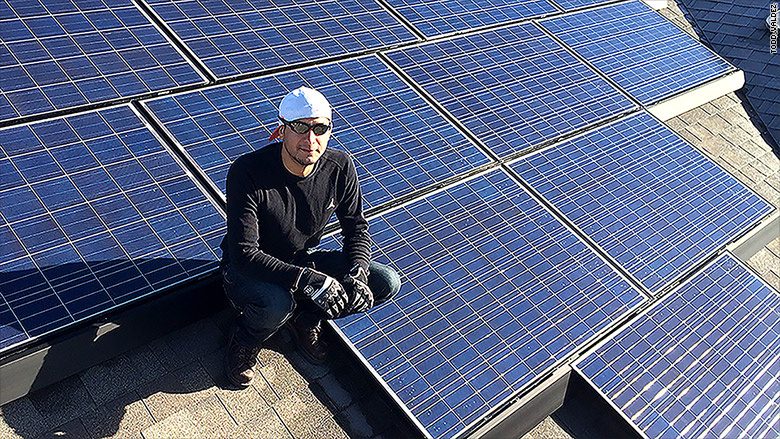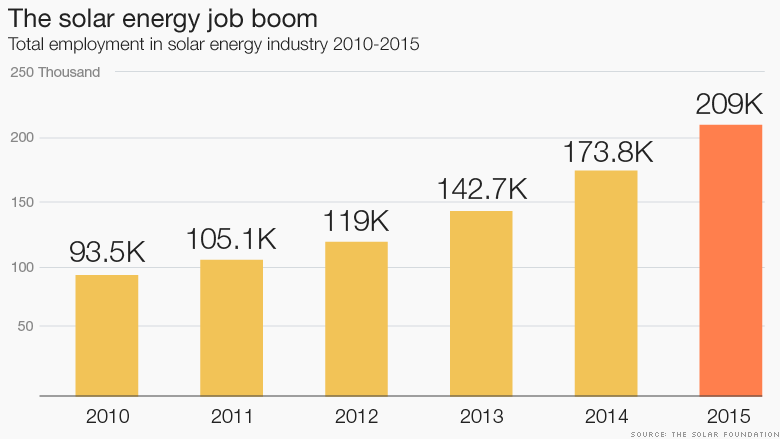
Solar energy is having a moment.
The number of solar jobs in the U.S. has more than doubled in five years. In fact, there are more people working in solar now than at oil rigs and in gas fields.
The solar industry added 35,000 jobs in 2015, up 20% from the previous year, according to the Solar Foundation, a nonprofit in Washington D.C.. The group is not funded by solar companies.
In contrast, oil and gas firms slashed nearly 17,000 extraction jobs in 2015 as energy prices continue to plummet. Oil prices are down a stunning 70% in the last 18 months and hovering just over $30 a barrel, a 12-year low.
There are about 209,000 solar energy employees in the U.S. They include solar panel installers, designers, engineers, sales folks and managers.
Today, the solar industry workforce is bigger than that of oil and gas construction, and nearly three times the size of the entire coal mining workforce.
"The companies we're working with are begging to fill the [job] slots they have because they're growing so much," says Chris Gorrie, campus president of the Ecotech Institute, a for-profit job training center for solar and renewable energy in Aurora, Co.
Related: Bill Gates launches multi-billion dolalr clean energy fund

Americans overall are just starting to see wage growth pick up, but solar workers have already seen paychecks improve.
In December, wages in the United States rose 2.5% compared to a year prior. Solar installers are making $21 an hour on average, up 5% from a year ago -- or double the national average, according to the Solar Foundation.
Todd Valdez knows the money is good. He went to the Ecotech Institute in 2012 and started his own solar company, Sunkey Energy, two and a half years ago.
His firm designs, installs and sells solar panels and employs 25 people, 15 of whom he hired just last year.
Valdez pays most of his employees $22 to $25 an hour, and his master electricians north of $30 an hour. Two of his employees left the oil industry last year to work for him. He says the amount of solar power his company installs has tripled in volume between 2014 and 2015.
Related: World leaders agree on climate change agreement in Paris
"Our workload has definitely been rising tremendously," Valdez told CNNMoney by phone while on one of his work sites in Broomfield, Co. The solar industry is "a good place to go now if you're looking for a career change."
Solar jobs -- particularly installers who work on roofs -- are not for everyone, Valdez cautions. It's lots of outdoor work, with heavy equipment. He's seen people quit "in hour one."
Colorado is one of the hottest states for solar, Valdez says and California has the most solar energy jobs in the country.
But it's not all sun drenched states either: No. 2 for solar jobs is Massachusetts, thanks to policies that have made it attractive for residents to install solar panels.
Experts say solar technology is good enough now that panels don't require direct exposure to the sun to generate electricity. New York and Arizona are also top states for solar job seekers, according to the Solar Foundation.
A few key developments are driving the job surge in solar.
Businesses and homeowners are eligible for a 30% tax credit if they install solar panels on their property. That's been in place since 2006 but in December Congress renewed the tax credit for another six years. That lowers installation costs considerably.
The climate change agreement in Paris and the global action plan to limit global warming is also a positive for the clean energy industry.
And the Environmental Protection Agency released plans last year to force states to lower their carbon output.
Related: This solar company will power Middle East oil
It also helps that solar equipment costs are down nearly 70% since 2010 too, according to Andrea Luecke, president of the Solar Foundation. Those declining costs are another incentive for homeowners to switch to solar, she says.
Cheap oil and gas prices are creating a short-term headwind for solar, Luecke admits. A few years ago, solar was seen as a cheaper alternative to oil and gas. Now with oil and gas prices so low, it's hard to convince some consumers to switch to solar.
"Natural gas is very, very inexpensive in many markets so it's hard to disagree with it," says Luecke.
But she counters: "solar and clean energy are here to stay."


